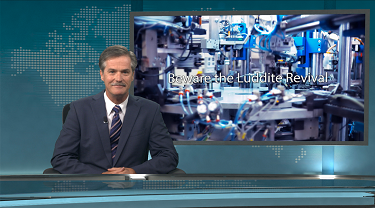Beware of the Luddite Revival
Are machines taking over our lives?

“Machines are taking over”. It’s an ubiquitous theme in business literature today, and for good reason. Robotics, data gathering, digitization, and artificial intelligence are among the key factors revolutionizing the way things are done. Change and disruption are occurring at a blinding pace, forcing themselves on all organizations, and resurrecting an age-old question about the role of humans. Should we worry?
This clarion call dates back to the first industrial revolution in the late 1700s. It motivated a frustrated Ned Ludd to gate-crash a stocking-weaving outfit and wreck the “job-killing” equipment. Dislocations at the time were catastrophic for many, and Ludd’s actions touched off a movement that reckoned that the only way to preserve economic order was to summarily wipe out the factory machinery that was upending methods of production. The Luddite movement did not ultimately prevail, as humans found ways to reorganize industrial activities that clearly made everyone better off – eventually.
Millions of workers are being displaced
Many worry that today’s changes are having a similar effect – witness the millions of displaced workers in Western economies, a full decade after the Great Recession. There’s heightened fear that there is a class of worker that no longer fits in – technology has rendered them economically irrelevant, and the capitalist system is throwing them onto a demographic ash-heap. The worry-warts see worse ahead: fearful of the inexorable, exponential increase in technology, they see mass-marginalization not only of blue-collar workers, but of the white-collar set as well.
Left to itself, the capitalist system does create enormous dislocations, and unaided, does not have a great record of rectifying them. Straight-line projections of outcomes thus lead to cataclysmic predictions that ultimately prove fantastically wrong. Why? They almost always forget that the same ingenuity that is revolutionizing production is applied to economic reorganization in a way that has proven over time to raise everyone’s standard of living.
Populism is a key threat to progress
Failure to recognize and broadly articulate this could lead to a Luddite revival. Today’s large mass of displaced workers are speaking out, manifest in the election or near-election of candidates speaking out against the established economic order – globalization, post-war institutions, government, big business, the ‘1 per cent’ – and threatening to take a sledgehammer to these pillars as a means of setting things straight. These neo-leaders’ search for the victims’ villain might well lead the mob to technology’s front door.
But…unemployment is at record lows
Here’s where the facts are essential, and there are key arguments that easily refute populist arguments. First and foremost, our techno-world coincides with some of the lowest official unemployment rates on record, in economy after economy. Second, there are chronic shortages of skilled workers, here in Canada, in the US and all over Western Europe, creating opportunities for retraining and career change. Third, for displaced workers there is hope in the fact that key segments of the economy have still not seen a true post-recession recovery. And some of these industries are key employers of the semi-skilled. It would seem that mass displacement is either still a long way off, or we are proving that we are far more adaptable than the 18th century world was.
This is not to say that we should just sit on the sidelines and watch it all play out. Far from it; in fact, the real-time concerns are a necessary motivator to action. Organizations of all types know that they must transform, and individuals need to keep an eye on changes, and know that adaptation is critical. One huge advantage is the universal availability of information to guide these decisions. A key adversary to adaptation is misinformation – populist messaging that seems instinctively logical, but can in actual fact be diametrically opposed to economic principle and ultimate prosperity. Ludd’s intentions were good, but his actions, if successful, would have condemned us to per capita penury.
The bottom line?
Technology will continue to transform the way we all interact with the economy. There will, as always, be painful fallout. Successful adaptation is key; a Luddite response reverses everything – including general welfare.
















